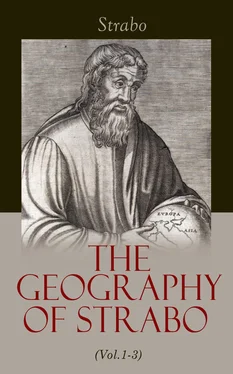Strabo - The Geography of Strabo (Vol.1-3)
Здесь есть возможность читать онлайн «Strabo - The Geography of Strabo (Vol.1-3)» — ознакомительный отрывок электронной книги совершенно бесплатно, а после прочтения отрывка купить полную версию. В некоторых случаях можно слушать аудио, скачать через торрент в формате fb2 и присутствует краткое содержание. Жанр: unrecognised, на английском языке. Описание произведения, (предисловие) а так же отзывы посетителей доступны на портале библиотеки ЛибКат.
- Название:The Geography of Strabo (Vol.1-3)
- Автор:
- Жанр:
- Год:неизвестен
- ISBN:нет данных
- Рейтинг книги:3 / 5. Голосов: 1
-
Избранное:Добавить в избранное
- Отзывы:
-
Ваша оценка:
- 60
- 1
- 2
- 3
- 4
- 5
The Geography of Strabo (Vol.1-3): краткое содержание, описание и аннотация
Предлагаем к чтению аннотацию, описание, краткое содержание или предисловие (зависит от того, что написал сам автор книги «The Geography of Strabo (Vol.1-3)»). Если вы не нашли необходимую информацию о книге — напишите в комментариях, мы постараемся отыскать её.
The Geography of Strabo (Vol.1-3) — читать онлайн ознакомительный отрывок
Ниже представлен текст книги, разбитый по страницам. Система сохранения места последней прочитанной страницы, позволяет с удобством читать онлайн бесплатно книгу «The Geography of Strabo (Vol.1-3)», без необходимости каждый раз заново искать на чём Вы остановились. Поставьте закладку, и сможете в любой момент перейти на страницу, на которой закончили чтение.
Интервал:
Закладка:
2. The whole of this country is irrigated by rivers descending from the Alps, the Cevennes, and the Pyrenees, some of which discharge themselves into the ocean, others into the Mediterranean. The districts through which they flow are mostly plains interspersed with hills, and having navigable streams. The course of these rivers is so happily disposed in relation to each other, that you may traffic from one sea to the other, 1308carrying the merchandise only a small distance, and that easily, across the plains; but for the most part by the rivers, ascending some, and descending others. The Rhone is pre-eminent in this respect, both because it communicates with many other rivers, and also because it flows into the Mediterranean, which, as we have said, is superior to the ocean, 1309and likewise passes through the richest provinces of Gaul. The whole of the Narbonnaise produces the same fruits as Italy. As we advance towards the north, and the mountains of the Cevennes, the plantations of the olive and fig disappear, but the others remain. Likewise the vine, as you proceed northward, does not easily mature its fruit. The entire of the remaining country produces in abundance corn, millet, acorns, and mast of all kinds. No part of it lies waste except that which is taken up in marshes and woods, and even this is inhabited. The cause of this, however, is rather a dense population than the industry of the inhabitants. For the women there are both very prolific and excellent nurses, while the men devote themselves rather to war than husbandry. However, their arms being now laid aside, they are compelled to engage in agriculture. These remarks apply generally to the whole of Transalpine Keltica. We must now describe particularly each of the four divisions, which hitherto we have only mentioned in a summary manner. And, first, of the Narbonnaise.
3. The configuration of this country resembles a parallelogram, the western side of which is traced by the Pyrenees, the north by the Cevennes; as for the other two sides, the south is bounded by the sea between the Pyrenees and Marseilles, and the east partly by the Alps, 1310and partly by a line drawn perpendicularly from these mountains to the foot of the Cevennes, which extend towards the Rhone, and form a right angle with the aforesaid perpendicular drawn from the Alps. To the southern side of this parallelogram we must add the sea-coast inhabited by the Massilienses 1311and Salyes, 1312as far as the country of the Ligurians, the confines of Italy, and the river Var. This river, as we have said before, 1313is the boundary of the Narbonnaise and Italy. It is but small in summer, but in winter swells to a breadth of seven stadia. From thence the coast extends to the temple of the Pyrenæan Venus, 1314which is the boundary between this province and Iberia. Some, however, assert that the spot where the Trophies of Pompey stand is the boundary between Iberia and Keltica. From thence to Narbonne is 63 miles; from Narbonne to Nemausus, 131588; from Nemausus through Ugernum 1316and Tarusco, to the hot waters called Sextiæ 1317near Marseilles, 53; 1318from thence to Antipolis and the river Var, 73; making in the total 277 miles. Some set down the distance from the temple of Venus to the Var at 2600 stadia; while others increase this number by 200 stadia; for there are different opinions as to these distances. As for the other road, which traverses the [countries [Pg 268] [CAS. 179] of the] Vocontii 1319and Cottius, 1320from Nemausus 1321to Ugernum and Tarusco, the route is common; from thence [it branches off in two directions], one through Druentia and Caballio, 1322to the frontiers of the Vocontii and the commencement of the ascent of the Alps, which is 63 miles; the other is reckoned at 99 miles from the same point to the other extremity of the Vocontii, bordering on the state of Cottius, as far as the village of Ebrodunum. 1323The distance is said to be the same by the route through the village of Brigantium, 1324Scingomagus, 1325and the passage of the Alps to Ocelum, 1326which is the limit of the country of Cottius. However, it is considered to be Italy from Scingomagus. And Ocelum is 28 miles beyond this.
4. Marseilles, founded by the Phocæans, 1327is built in a stony region. Its harbour lies beneath a rock, which is shaped like a theatre, and looks towards the south. It is well surrounded with walls, as well as the whole city, which is of considerable size. Within the citadel are placed the Ephesium and the temple of the Delphian Apollo. This latter temple is common to all the Ionians; the Ephesium is the temple consecrated to Diana of Ephesus. They say that when the Phocæans were about to quit their country, an oracle commanded them to take from Diana of Ephesus a conductor for their voyage. On arriving at Ephesus they therefore inquired how they might be able to obtain from the goddess what was enjoined them. The goddess appeared in a dream to Aristarcha, one of the most honourable women of the city, and commanded her to accompany the Phocæans, and to take with her a plan of the temple and statues. 1328These things being performed, and the colony being settled, the Phocæans built a temple, and evinced their great respect for Aristarcha by making her priestess. All the colonies [sent out from Marseilles] hold this goddess in peculiar reverence, preserving both the shape of the image [of the goddess], and also every rite observed in the metropolis.
5. The Massilians live under a well-regulated aristocracy. They have a council composed of 600 persons called timuchi, 1329who enjoy this dignity for life. Fifteen of these preside over the council, and have the management of current affairs; these fifteen are in their turn presided over by three of their number, in whom rests the principal authority; and these again by one. No one can become a timuchus who has not children, and who has not been a citizen for three generations. 1330Their laws, which are the same as those of the Ionians, they expound in public. Their country abounds in olives and vines, but on account of its ruggedness the wheat is poor. Consequently they trust more to the resources of the sea than of the land, and avail themselves in preference of their excellent position for commerce. Nevertheless they have been enabled by the power of perseverance to take in some of the surrounding plains, and also to found cities: of this number are the cities they founded in Iberia as a rampart against the Iberians, in which they introduced the worship of Diana of Ephesus, as practised in their fatherland, with the Grecian mode of sacrifice. In this number too are Rhoa 1331[and] Agatha, 1332[built for defence] against the barbarians dwelling around the river Rhone; also Tauroentium, 1333Olbia, 1334Antipolis 1335and Nicæa, 1336[built as a rampart] against the nation of the Salyes and the Ligurians who inhabit the Alps. They 1337possess likewise dry docks and armouries. Formerly they had an abundance of vessels, arms, and machines, both for the purposes of navigation and for besieging towns; by means of which they defended themselves against the barbarians, [Pg 270] [CAS. 180] and likewise obtained the alliance of the Romans, to whom they rendered many important services; the Romans in their turn assisting in their aggrandizement. Sextius, who defeated the Salyes, founded, not far from Marseilles, a city 1338which was named after him and the hot waters, some of which they say have lost their heat. 1339Here he established a Roman garrison, and drove from the sea-coast which leads from Marseilles to Italy the barbarians, whom the Massilians were not able to keep back entirely. However, all he accomplished by this was to compel the barbarians to keep at a distance of twelve stadia from those parts of the coast which possessed good harbours, and at a distance of eight stadia where it was rugged. The land which they thus abandoned, he presented to the Massilians. In their city are laid up heaps of booty taken in naval engagements against those who disputed the sea unjustly. Formerly they enjoyed singular good fortune, as well in other matters as also in their amity with the Romans. Of this [amity] we find numerous signs, amongst others the statue of Diana which the Romans dedicated on the Aventine mount, of the same figure as that of the Massilians. Their prosperity has in a great measure decayed since the war of Pompey against Cæsar, in which they sided with the vanquished party. Nevertheless some traces of their ancient industry may still be seen amongst the inhabitants, especially the making of engines of war and ship-building. Still as the surrounding barbarians, now that they are under the dominion of the Romans, become daily more civilized, and leave the occupation of war for the business of towns and agriculture, there is no longer the same attention paid by the inhabitants of Marseilles to these objects. The aspect of the city at the present day is a proof of this. For all those who profess to be men of taste, turn to the study of elocution and philosophy. Thus this city for some little time back has become a school for the barbarians, and has communicated to the Galatæ such a taste for Greek literature, that they even draw contracts on the Grecian model. While at the present day it so entices the noblest of the Romans, that those desirous of studying resort thither in preference to Athens. These the Galatæ observing, and being at leisure on account of the peace, readily devote themselves to similar pursuits, and that not merely individuals, but the public generally; professors of the arts and sciences, and likewise of medicine, being employed not only by private persons, but by towns for common instruction. Of the wisdom of the Massilians and the simplicity of their life, the following will not be thought an insignificant proof. The largest dowry amongst them consists of one hundred gold pieces, with five for dress, and five more for golden ornaments. More than this is not lawful. Cæsar and his successors treated with moderation the offences of which they were guilty during the war, in consideration of their former friendship; and have preserved to the state the right of governing according to its ancient laws. So that neither Marseilles nor the cities dependent on it are under submission to the governors sent [into the Narbonnaise]. So much for Marseilles.
Читать дальшеИнтервал:
Закладка:
Похожие книги на «The Geography of Strabo (Vol.1-3)»
Представляем Вашему вниманию похожие книги на «The Geography of Strabo (Vol.1-3)» списком для выбора. Мы отобрали схожую по названию и смыслу литературу в надежде предоставить читателям больше вариантов отыскать новые, интересные, ещё непрочитанные произведения.
Обсуждение, отзывы о книге «The Geography of Strabo (Vol.1-3)» и просто собственные мнения читателей. Оставьте ваши комментарии, напишите, что Вы думаете о произведении, его смысле или главных героях. Укажите что конкретно понравилось, а что нет, и почему Вы так считаете.












![Anne Blunt - A Pilgrimage to Nejd, the Cradle of the Arab Race. Vol. 2 [of 2]](/books/750183/anne-blunt-a-pilgrimage-to-nejd-the-cradle-of-the-thumb.webp)